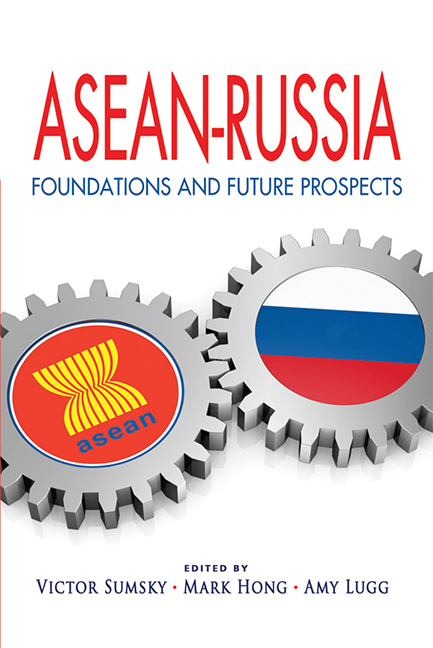Book contents
- Frontmatter
- Contents
- Foreword
- Preface
- About the Contributors
- Keynote Address
- Opening Remarks
- Keynote Address
- Introduction: Russia and the ASEAN Member States: Political and Economic Cooperation in Progress
- SECTION I WISEMEN'S VIEWS
- SECTION II GEOPOLITICS
- SECTION III BILATERAL RELATIONS
- SECTION IV Business and Economics
- SECTION V CULTURE AND EDUCATION
- EPILOGUE
- Index
Opening Remarks
Published online by Cambridge University Press: 21 October 2015
- Frontmatter
- Contents
- Foreword
- Preface
- About the Contributors
- Keynote Address
- Opening Remarks
- Keynote Address
- Introduction: Russia and the ASEAN Member States: Political and Economic Cooperation in Progress
- SECTION I WISEMEN'S VIEWS
- SECTION II GEOPOLITICS
- SECTION III BILATERAL RELATIONS
- SECTION IV Business and Economics
- SECTION V CULTURE AND EDUCATION
- EPILOGUE
- Index
Summary
Dear friends,
Distinguished panelists,
Ladies and Gentlemen,
It is my great pleasure to address you prior to the start of a discussion on economic cooperation between Russia and the Association of Southeast Asian Nations (ASEAN).
In my view, this part of the conference might be the most interesting one as it deals with the issues of practical interaction between the partners, the kind of interaction that can be measured in material terms.
Previous discussions summarized what we managed to achieve in terms of political, strategic and functional cooperation during the fifteen years of our dialogue partnership. We have to our common credit two summits, numerous joint declarations and statements, and a solid legal framework to regulate cooperation. Russia is now a participant in so many ASEANcentred multilateral formats — the ASEAN Regional Forum (ARF), the ASEAN Defence Ministers Meeting (ADMM) Plus, the Asia-Europe meeting (ASEM) and most recently the East Asia Summit (EAS).
No doubt, these are very important achievements reflecting Russia's growing engagement in Asian affairs and recognition of ASEAN's central role in the region.
At the same time it is very clear that the Russia-ASEAN dialogue is strongly focused on political and security issues, while economic cooperation lags behind. Why is it so? And what needs to be done in order to correct this structural imbalance?
Before I share with you some of my thoughts on this subject, I should warn you that the substance and the scope of my views are influenced by my current status as the Russian Ambassador to Singapore. However, I tend to think that whatever positive developments there are in the field of economic cooperation between Russia and Singapore, these could be projected and replicated in the entire ASEAN format for the benefit of both sides.
Let me start from the basics. Economic interaction, be it trade, investments, tourism or services, starts with people, with their very human and natural interest to explore something unknown, with their passion to look for new opportunities, which seem to abound in foreign lands.
- Type
- Chapter
- Information
- ASEAN-RussiaFoundations and Future Prospects, pp. xxxvii - xlPublisher: ISEAS–Yusof Ishak InstitutePrint publication year: 2012



